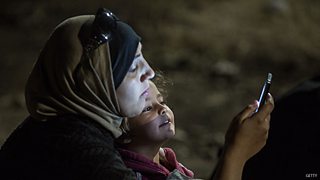The post-2015 Global Goals: moving from βwhatβ to βhowβ will rest on more informed societies
James Deane
Director, Policy and Learning
Tagged with:

Ahead of this week's UN summit in New York, ΒιΆΉΤΌΕΔ Media Action’s Director of Policy and Learning argues for a stronger focus on the provision of information as well as resources.
"This Agenda is a plan of action for people, planet and prosperity." So begins the outcome document which forms the basis of the agreement for a new set of "global goals" which are expected to be signed by 215 world leaders this week. It is a statement that encapsulates both their ambition and weakness.
Anyone who comments on the post-2015 goals does so from a particular standpoint. Let me set out mine. The new development goals that replace the MDGs provide a welcome and clear agenda, but they do not and cannot provide a comprehensive plan for poverty alleviation and human development in the 21st century.
Planning the planet to prosperity is neither feasible nor desirable. Development over the next decades will depend as much on how societies and economies adapt to the challenges they face, as on the 17 goals and 169 targets that make up the new development goals. How societies adapt in the future is - as it has been in the past - likely to depend on the trustworthiness and usefulness of information available to them.
As someone who works to support media and other strategies that lead to more informed societies, that perspective shapes my view of the goals. Government, development agencies and other development actors will be central to translating the goals from words to actions. But ultimately progress will also depend on how societies and people act and adapt. That will depend on many factors, but a central one will centre around issues of information and communication.
The agenda assessed
that an important measure of human progress in the future would be to ask people whether they feel they have access to the information they need to make the decisions (political, economic and otherwise) that best enable them to make the most of their lives. This is mainly what I mean by an 'informed society'. While that measure seems unlikely to feature in the future metrics to measure the success of the goals, there is ample room in the current text to make progress.
Target 16.10 in the outcome document makes a commitment to ensuring "public access to information and to protecting fundamental freedoms, in accordance with national legislation and international agreements". Target 12.8 sets out the aim that "by 2030 people everywhere [will] have the relevant information and awareness for sustainable development and lifestyles in harmony with nature". And Target 3.7 is to ensure by 2030 "universal access to sexual and reproductive health care services, including for family planning, information and education, and the integration of reproductive health into national strategies and programmes".
Stronger focus
Ultimately, the issue is not about the text of the new declaration or whether issues of media, information and communication are highlighted in it. The arguments over what issues should or should not be included have preoccupied the energy and time of many thousands in the run up to the summit.
The issue is more about the balance between such visions and the adaptive capabilities and energies of people who have most to win or lose from the success of these goals. I believe both are needed. Too little development attention has in the past been paid to creating the best environment – including the best information environment – that enables people to determine their future.
The 2015 World Bank's World Development Report opened with this sentence: "Every person seeks to steer his or her own course, and a great deal of development policy aims to supply the resources and information people in low- and middle-income economies require in their voyage through life."
It is true that development policy has focused on providing the resources, less clear that it has provided the information. In the highly complex and dynamic information societies of the 21st century, the success of the global goals will require a stronger focus on the information available to people as well as the resources.
Related links
Follow ΒιΆΉΤΌΕΔ Media Action on and
